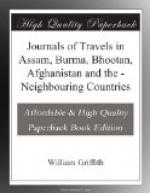April 1st.—The march to Punukha extended over a most barren dried-up country, the features presented were the same as those about Phain. We proceeded at first in the direction of Wandipore, then diverged, proceeding downwards in the direction of the villages. The remainder of our journey extended either just above the base of the hills, or along the valley: the distance was nine miles. The march was an uninteresting one; the only pretty part being the river that drains the valley, and it is one of considerable size, fordable in but few places; the rapids are frequent, but the intermediate parts flow gently. We were all dreadfully disappointed in the capital, the castle even is by no means so imposing as that of Tongsa or Byagur; the city miserable, consisting of a few mean houses, and about as many ruined ones.
The surrounding cultivation is chiefly poor wheat; the hills the most barren conceivable. On arriving near the palace we made a detour, to avoid exposure to the usual regal insolence: our plan was effectual. From some distance I had espied our quarters, and although our mission is one sent by the most powerful eastern government, yet we had allotted to us a residence fit only for hogs.
It consisted of a court-yard, surrounded by walls, and what had evidently been stabling; the apartments were numerous, but excessively small, the roof of single mats. The place swarmed with vermin. In this we determined not to stay, and so proceeded to the city, (for sure there cannot be a capital without a city,) and there, after some delay, procured two houses, in one of which the present Tongso Pillo had lodged before his present exaltation. But imagine not that it was a palace. The two houses together furnished three habitable rooms.
I imagine not that the houses were procured for us by the local government. We only obtained them by Pemberton’s liberality was well known. The Sepoys’ lines were transported hither not by Bhooteas but by our own people. In addition the people are in many cases insolent, and it was only after a peremptory message to the Deb, stating what the consequences would be of such a system of annoyance, that we got any assistance.
April 3rd.—We have heard nothing of the Mutaguat. It appears that the country is unsettled now. The old Deb having possession of Tassisudon, and the people here declaring they will stop all supplies if the Deb does not, according to custom, repair at the usual period to Tassisudon. A Deewan here, who has held office under four Rajahs, says, that the present truce is owing to the hot weather; Bhooteas only admire fighting in the cold season, in conformation of which, he says that in the cold season the contest will be renewed. There will then be an additional bone of contention for the present. Nor should I much wonder if the Paro Pillo then comes forward and takes the Debship and all away. The Deewan’s account of the past fighting, places the Bhooteas in a most contemptible light: it appears that when they fire a gun, they take no aim, their only aim being to place their bodies as far as possible from the weapon; the deadly discharge is followed up by the deadlier discharge of a stone. At plunder they are more adroit.




